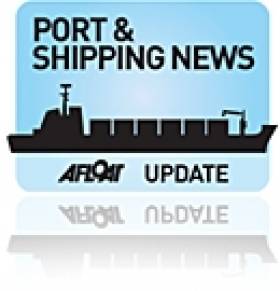Displaying items by tag: Irish Competition Authority
Warrenpoint Port Welcomes Seatruck Ferries Acquisition Announcement
Operator Seatruck Ferries announced last week that, subject to regulatory approval from the Irish competition authorities, it is to be acquired from Clipper Group by CLdN.
CLdN, headquartered in Luxembourg is one of Europe’s leading multimodal logistics providers with three divisions CLdN RoRo, CLdN Cargo and CLdN Ports.
Seatruck operates a daily ro-ro (roll on roll off) ferry service from Warrenpoint Port to Heysham, specialising in primarily unaccompanied loads. This model increases efficiency both from an environmental and an operational perspective.
Seatruck, operational since 1996, was acquired by Clipper in 2002. It currently owns eight purpose-built ro-ro vessels of which six are operating on the Irish Sea and two are on charter.
David Holmes, CEO Warrenpoint Port said, “We would like to congratulate the Seatruck team on their acquisition. CLdN is a leading name in the maritime sector, and it is fantastic to now have the brand operational in Warrenpoint. We are delighted to say that for service users, it will be ‘business as usual’. Nothing will change, the Seatruck brand will be retained and the team will continue to be led by Alistair Eagles.”
David continued, “Seatruck has been operational at Warrenpoint Port for 20 years’, providing a vital service for Irish Sea traffic. In more recent years, with increasing costs, the unaccompanied trailer model, has become particularly attractive for haulage companies and logistics providers. We look forward to continuing to drive growth and to building on the strong foundations of our relationship with Seatruck, under their new ownership.”
CLdN and Clipper Group have agreed not to disclose the transaction price.
Afloat.ie adds that Seatruck operate additional Irish Sea routes: Dublin-Heysham and Dublin-Liverpool which are also part of the transaction. Combined the three routes transport close to 20% of the region’s seaborne cargo volumes.
Competition Authority to Examine Irish Ports
#PORTS & SHIPPING – Irish Ports are to be reviewed by an in-depth Government Plan to see how funding expansion of the nation's ports can be carried out through the private sector. The Government have ruled-out selling strategic port facilities to fund such projects.
Transport Minister Leo Varadkar said that a study by the Competition Authority into Ireland's ports would also examine whether Dublin Port had an economically dominant position. Minister Varadkar said that "Dublin Port is hugely successful with 40% of our GDP going through it."
He said that "part of our study will look at whether it is profitable because it is dominant or because it is very competitive."
Minister Varadkar said that "Dublin Port is hugely successful with 40% of our GDP going through it" and added "part of our study will look at whether it is profitable because it is dominant or because it is very competitive."
For more on this story as reported by RTE News click HERE.





























































